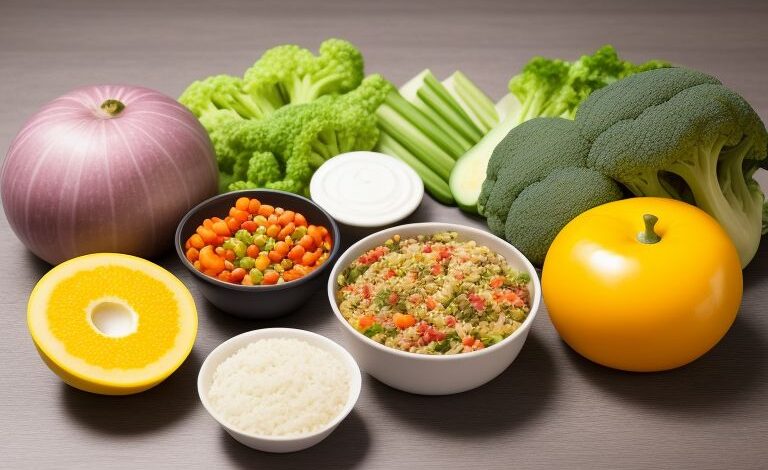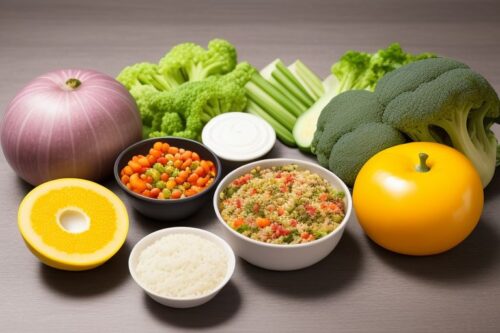Vegetarian Diet for Weight Gain: A Complete Guide to Healthy and Effective Weight Gain

Vegetarian Diet for Weight Gain: A Complete Guide to Healthy and Effective Weight Gain
Weight gain is often seen as something only bodybuilders or athletes focus on, but it’s a common goal for many people. While most health articles talk about losing weight, there are plenty of individuals who struggle to gain weight in a healthy manner. This could be due to a fast metabolism, health conditions, or simply a lifestyle that makes it hard to pack on extra pounds. For vegetarians, this challenge can seem even more daunting, as their diet excludes high-calorie meat products.
However, gaining weight on a vegetarian diet is entirely possible and can be done in a healthy, sustainable way. In this comprehensive guide, we’ll explore the best foods, meal plans, and tips for effectively gaining weight as a vegetarian.

Understanding Weight Gain on a Vegetarian Diet
To understand how to gain weight on a vegetarian diet, it's essential to first understand the science behind weight gain. The basic principle for gaining weight is simple: consume more calories than you burn. However, it’s important to focus on gaining weight in a healthy way, not just by eating junk food. Here’s what you need to know:
Caloric Surplus
To gain weight, you need to create a caloric surplus, meaning you’re eating more calories than your body needs to maintain its current weight. The number of calories you need varies depending on factors like age, gender, activity level, and metabolism. For most people looking to gain weight, this means adding an extra 300–500 calories per day above their maintenance needs.
Macronutrients: Protein, Carbohydrates, and Fats
To achieve a healthy weight gain, it’s crucial to balance your intake of the three primary macronutrients: protein, carbohydrates, and fats. Each plays a role in muscle building, energy, and overall health.
- Protein: Protein is vital for muscle growth and repair. This is especially important when trying to gain healthy weight, as you’ll want to build muscle rather than store fat. Great vegetarian protein sources include beans, lentils, tofu, and dairy products.
- Carbohydrates: Carbs provide the energy your body needs to function and support weight gain. Complex carbohydrates like whole grains, fruits, and vegetables are ideal choices for a vegetarian weight gain diet.
- Fats: Healthy fats are calorie-dense, making them essential for adding calories without eating huge portions. Opt for unsaturated fats found in nuts, seeds, avocados, and olive oil.
Micronutrients
While focusing on macronutrients, don’t forget about vitamins and minerals. A well-balanced diet should include plenty of vitamins and minerals to support your overall health. For vegetarians, certain nutrients like vitamin B12, iron, and omega-3 fatty acids may require extra attention.
Best Vegetarian Foods for Weight Gain
Eating the right foods is the key to gaining weight on a vegetarian diet. Focus on high-calorie, nutrient-dense foods that provide your body with the energy and nutrients it needs. Here’s a breakdown of the best vegetarian-friendly foods for weight gain:
High-Protein Foods
Protein is essential for muscle growth, and a plant-based diet can provide plenty of protein sources. Here are some of the best vegetarian protein-rich foods:
- Legumes: Beans, lentils, chickpeas, and peas are all excellent sources of plant-based protein. They’re also packed with fiber and can be easily incorporated into various dishes like soups, stews, and salads.
- Tofu and Tempeh: Tofu and tempeh are made from soybeans and are incredibly versatile. Both are high in protein and can be marinated, grilled, or added to stir-fries and curries.
- Quinoa: Quinoa is a complete protein, meaning it contains all nine essential amino acids that your body needs for muscle repair and growth. It’s also rich in carbohydrates, making it a great addition to a weight-gain diet.
- Nuts and Seeds: Almonds, walnuts, chia seeds, flaxseeds, and sunflower seeds are nutrient-dense and contain healthy fats and protein. Add them to smoothies, oatmeal, or salads for an extra calorie boost.
- Dairy Products: If you consume dairy, foods like Greek yogurt, cheese, and milk are rich in protein and fat, making them ideal for weight gain. Opt for full-fat versions to increase your calorie intake.
- Seitan: Seitan, also known as wheat gluten, is a high-protein meat substitute often used in vegetarian and vegan diets. It can be grilled, sautéed, or added to dishes for a meat-like texture.
High-Carbohydrate Foods
Carbohydrates provide the energy your body needs to function, and they’re a critical component of any weight gain diet. Here are some high-carb foods that can help with weight gain:
- Whole Grains: Brown rice, whole wheat bread, oats, and barley are great sources of complex carbohydrates and provide lasting energy. They’re also packed with fiber, which aids digestion and keeps you feeling full.
- Sweet Potatoes and Potatoes: These starchy vegetables are high in calories and carbs, making them perfect for a weight-gain diet. They’re also versatile and can be prepared in numerous ways, from mashed to roasted.
- Pasta: Whole wheat pasta is an excellent source of carbohydrates, and it’s easy to pair with protein-rich sauces like marinara with lentils or tofu.
- Fruits: While fruit is often thought of as low-calorie, certain fruits like bananas, avocados, and dried fruits (dates, raisins, apricots) are higher in calories and can help increase your caloric intake.
High-Fat Foods
Healthy fats are a crucial part of any diet for weight gain because they are more calorie-dense than protein or carbs. Incorporating the following high-fat foods will help you meet your daily caloric needs:
- Avocados: Avocados are rich in heart-healthy fats and calories, making them a great addition to any meal. They can be spread on toast, blended into smoothies, or added to salads.
- Nuts and Nut Butters: Almonds, cashews, and peanut butter are excellent sources of healthy fats and protein. Snack on a handful of nuts or add nut butter to smoothies, oatmeal, or toast for extra calories.
- Olive Oil and Coconut Oil: Using olive oil or coconut oil in your cooking is an easy way to add healthy fats to your diet. Drizzle olive oil over salads or vegetables, and use coconut oil for stir-fries or baking.
- Seeds: Flaxseeds, chia seeds, hemp seeds, and pumpkin seeds are packed with healthy fats and calories. Add them to your smoothies, salads, or yogurt for a nutritional boost.
Sample Meal Plan for Weight Gain on a Vegetarian Diet
A well-planned diet is key to successful weight gain. Here's a sample meal plan that includes high-calorie, nutrient-dense foods to help you reach your weight gain goals while maintaining a balanced vegetarian diet.
Breakfast: High-Calorie Smoothie Bowl
- Ingredients:
- 1 banana
- 1/2 avocado
- 1/2 cup Greek yogurt or plant-based yogurt
- 1 tablespoon peanut butter
- 1 tablespoon chia seeds
- 1/4 cup oats
- 1 tablespoon honey
- A handful of berries
- Why it works: This smoothie bowl provides a good balance of healthy fats, protein, and carbs to kickstart your day with plenty of energy. The peanut butter and avocado add calories without making you feel too full.
Morning Snack: Trail Mix and Dried Fruit
- Ingredients:
- 1/4 cup almonds
- 1/4 cup walnuts
- 1/4 cup dried cranberries
- 1/4 cup dried apricots
- Why it works: This snack is calorie-dense and easy to eat on the go. Nuts provide healthy fats and protein, while dried fruits offer carbs and fiber.
Lunch: Quinoa and Lentil Salad
- Ingredients:
- 1 cup cooked quinoa
- 1/2 cup cooked lentils
- 1/4 cup chopped cucumber
- 1/4 cup cherry tomatoes
- 1/4 avocado
- 1 tablespoon olive oil
- Lemon juice for dressing
- Why it works: This meal combines protein-rich lentils and quinoa with healthy fats from the avocado and olive oil. It’s light yet filling, providing all the nutrients you need to support muscle growth and weight gain.
Afternoon Snack: Whole Wheat Toast with Nut Butter and Banana
- Ingredients:
- 2 slices whole wheat toast
- 2 tablespoons almond or peanut butter
- 1 banana, sliced
- Why it works: The whole wheat toast provides complex carbohydrates, while the nut butter and banana add protein, healthy fats, and extra calories.
Dinner: Tofu Stir-Fry with Brown Rice
- Ingredients:
- 1/2 block firm tofu, cubed
- 1 cup cooked brown rice
- 1/2 cup broccoli
- 1/4 cup bell peppers
- 1 tablespoon sesame oil
- 2 tablespoons soy sauce
- Sesame seeds for garnish
- Why it works: Tofu is an excellent source of plant-based protein, and the brown rice adds complex carbohydrates. The sesame oil provides healthy fats, while the vegetables offer fiber and essential vitamins.
Evening Snack: Greek Yogurt with Honey and Nuts
- Ingredients:
- 1 cup full-fat Greek yogurt
- 1 tablespoon honey
- 1/4 cup mixed nuts (almonds, walnuts, cashews)
- Why it works: This snack is high in protein and healthy fats, making it a perfect choice before bed to support overnight muscle repair and weight gain.
Tips for Gaining Weight on a Vegetarian Diet
Gaining weight can take time, so it’s important to stay consistent and make the most of every meal. Here are some additional tips to help you gain weight in a healthy and effective way:
1. Eat More Frequently
To gain weight, you need to increase your overall calorie intake, and eating more frequently is an easy way to do this. Aim to eat 5–6 smaller meals throughout the day rather than sticking to three large meals.
2. Choose Calorie-Dense Foods
Eating calorie-dense foods allows you to consume more calories without feeling overly full. Foods like nuts, seeds, avocado, and healthy oils are great examples of calorie-dense options that also provide important nutrients.
3. Add Healthy Snacks
Incorporating snacks between meals can help you meet your calorie goals without overwhelming your stomach. Choose snacks that are high in protein and healthy fats, such as nuts, nut butter, or Greek yogurt.
4. Stay Hydrated
While it’s important to eat enough, don’t forget to stay hydrated. Drink plenty of water throughout the day, but avoid filling up on low-calorie drinks like diet sodas. You can also include high-calorie drinks like smoothies or protein shakes.
5. Include Strength Training
Combining your vegetarian diet with strength training can help ensure that the weight you gain is muscle rather than fat. Lifting weights or engaging in bodyweight exercises stimulates muscle growth and can help you achieve a healthy, toned physique.
6. Track Your Progress
Keep track of your weight gain journey by monitoring your meals and progress over time. This will help you identify which foods work best for your body and allow you to adjust your diet as needed.
Frequently Asked Questions
Can I gain weight on a vegetarian diet?
Yes, it is entirely possible to gain weight on a vegetarian diet by consuming calorie-dense, nutrient-rich foods like nuts, seeds, whole grains, and healthy fats.
How much protein do I need for weight gain on a vegetarian diet?
The amount of protein you need depends on your weight and activity level. A good general recommendation is to consume between 0.8–1 gram of protein per pound of body weight.
What are good sources of protein on a vegetarian diet?
Great vegetarian protein sources include legumes, tofu, tempeh, seitan, quinoa, nuts, seeds, and dairy products like Greek yogurt and cheese.
Can smoothies help with weight gain?
Yes, smoothies are an excellent way to pack in extra calories and nutrients. Adding ingredients like nut butter, oats, avocado, and protein powder can make smoothies a calorie-dense meal or snack.
Should I eat more carbs or fats for weight gain?
Both carbohydrates and fats are important for weight gain. Carbs provide energy, while fats are calorie-dense and help meet your caloric goals more easily. Aim for a balanced intake of both.
Is it better to eat three large meals or multiple smaller meals for weight gain?
Eating smaller, more frequent meals can help you consume more calories throughout the day without feeling overly full or bloated. It also provides a steady stream of nutrients to support muscle growth and energy.
Gaining weight on a vegetarian diet is not only possible but can be done in a healthy and sustainable way with the right approach. By focusing on high-calorie, nutrient-dense foods, maintaining a balanced intake of macronutrients, and incorporating strength training, you can effectively achieve your weight gain goals. Remember, consistency is key, so stick to a well-planned diet and be patient with your progress.

